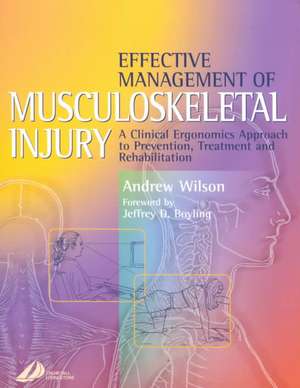Effective Management of Musculoskeletal Injury: A Clinical Ergonomics Approach to Prevention, Treatment, and Rehab
Autor Andrew Wilsonen Limba Engleză Paperback – 7 oct 2001
Effective Management of Musculoskeletal Injury is research-based. It develops models for the management of musculoskeletal pain that include manual therapy, exercise, ergonomic and psychosocial interventions. Throughout the text particular attention is paid to pain resulting from cumulative and chronic types of injury. The book will be a valuable resource for all practitioners who deal with the management of musculoskeletal pain as part of their day to day practice.
Preț: 310.07 lei
Preț vechi: 326.38 lei
-5% Nou
Puncte Express: 465
Preț estimativ în valută:
59.34€ • 61.87$ • 49.32£
59.34€ • 61.87$ • 49.32£
Carte indisponibilă temporar
Doresc să fiu notificat când acest titlu va fi disponibil:
Se trimite...
Preluare comenzi: 021 569.72.76
Specificații
ISBN-13: 9780443063534
ISBN-10: 0443063532
Pagini: 232
Ilustrații: 150 ills.
Dimensiuni: 186 x 245 x 14 mm
Greutate: 0.66 kg
Editura: Elsevier
Locul publicării:United Kingdom
ISBN-10: 0443063532
Pagini: 232
Ilustrații: 150 ills.
Dimensiuni: 186 x 245 x 14 mm
Greutate: 0.66 kg
Editura: Elsevier
Locul publicării:United Kingdom
Public țintă
All concerned with the management and prevention of musculoskeletal injury particularly low back pain.Primary: Manual therapists, osteopaths, chiropractors, manipulative and orthopaedic physiotherapists, ergonomists - students and practitioners for all these groups.
Secondary: Occupational therapists, occupational health nurses and practitioners, GPs/primary care practitioners, orthopaedic physicians and surgeons, Rheumatologists and rehab specialists.
Cuprins
Section 1. The injury processThe type of injury. Developing a management model. Understanding the symptoms. Understanding the physiology of the injury process. Ergonomic factors. Psychosocial aspects. Personal factors. Principles of treatment and management.Section 2. Low back painEpidemiology of low back pain. Risk factors for low back pain. The type of injury. Complex low back pain. Management.Section 3. Neck, shoulder and upper limb painNeck pain. Shoulder pain. Elbow, forearm and wrist pain. Nerve entrapments. Multiple tissue disorders. Management strategies for chronic injuries.References.
